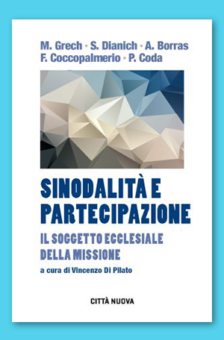
Sep 20, 2023 | Non categorizzato
The second year of the Synodal Training Course, which began in 2022, has been launched. The Course is organized by the Sophia University Institute’s Evangelii Gaudium Centre (CEG), with the collaboration of the General Secretariat of the Synod. The second year of the Synodality Training Course will focus on being “missionary disciples” at the service of universal fraternity. The 2023/2024 Course was inaugurated on 12th September: https://www.youtube.com/watch?v=v0set08JiKY Initiated by the “Evangelii Gaudium” Centre (CEG), a theological-pastoral training centre present within the Sophia University Institute in Loppiano (Italy), with the valuable collaboration of the General Secretariat of the Synod, the lessons will begin on 6th November. To learn more about it, we interviewed Prof. Vincenzo Di Pilato, Professor of Fundamental Theology at the Pugliese Theological Faculty in Italy and Coordinator of the CEG. Professor Di Pilato, what was your experience last year and what were the results? The first year of the Online Course on Synodality, which ended last May, was very rich and, I would say, exciting. The 248 participants came from the English-speaking world (Canada, Ireland, UK, and USA), Latin America (Brazil and almost all Spanish-speaking countries), Asia (India, Korea, Malaysia, Philippines, and Singapore), Africa (Burundi, Cameroon, Congo, Kenya, Nigeria, South Africa) and almost all European countries. There were many representatives of diocesan or national churches engaged in the synodal process, including priests, religious and lay people. The majority were Catholics of all vocations: priests, nuns, consecrated persons, lay people, even a Bishop. There were also representatives of other sister Churches. Although the videos and texts of the lessons were available on a web platform (especially for those who for whom the time was inconvenient), there were students from Asia who connected live, at three in the morning (local time). It was a strong experience. Then in June, at the end of the Course, we held the fourth and final module in a face-to-face workshop, at the “Vinea mea” Spirituality Centre in Loppiano (Italy). 130 people participated. We focussed on themes such as: clericalism, participatory processes and community discernment. It is now clear that the Course, which will open for the second consecutive year, represents an attempt to respond to the call that the Holy Spirit, since the days of the first Pentecost, addresses to us to “go out”. Among the many letters received, one was from a person in charge of the diocesan level of the synodal journey in Malaysia: “Thank you very much for the wonderful sessions. I am truly grateful for the opportunity to learn so much about the origins of the synodal Church and synodality. It really opened my eyes to the great wisdom and suggestions offered by the Holy Spirit who guides the Church. Honestly, while listening to the sessions of the first module, I felt so poor, but at the same time enriched. And that’s why I’ll be signing up for the next year. ” What issues will be addressed in this new year? First of all, we will try to be in tune with what will emerge from the Synodal Assembly next October. When we looked at the basic text (Instrumentum laboris) on which the members of the Ordinary General Assembly of the October Synod will work and which is the outcome of the community discernment during the listening phase, we realized that some issues seemed more urgent than others, such as: ministry, places and method of participation, formation to become “missionary disciples” at the service of universal fraternity. Each 3-hour lesson will take place via internet from 6.00 to 9.00 pm (Italian time) on Mondays from November 2023 – May 2024. The course will be in Italian with translations into English, Portuguese and Spanish. This year too, we will conclude with a face-to-face residential meeting here in Italy, again using a workshop methodology. You can register for the Course at this link: https://www.sophiauniversity.org/en/centro-evangelii-gaudium/. The active support of the General Secretariat of the Synod in these two years encourages us to move forward in being builders of unity in the Church and in the world, according to that synodal form with which Jesus lived his human-divine existence with the Apostles and with all his disciples. The “going out” to which the Holy Spirit impels us, through the clear voice of Pope Francis, is not, in fact, equivalent to dispersing, to fragmenting, but is to lead our individual spiritual life to that of the Forsaken and Risen Jesus who embraces everything and everyone. As the title of the Working Document for the continental stage of the Synod stated, it is a matter of “widening the space of our tent” (cf. Is 54.2).  You have just edited a book entitled, “Synodality and Participation, the ecclesial subject of mission”, (published by Città Nuova). It is a collection of interventions of experts from the ecclesiastical and theological world. What is the contribution of this text in the light of the documents which have emerged from the various stages of the Synodal Path and on the verge of the new universal stage? The book is a collection of the inputs of a research seminar organized by the CEG, on 24th June, 2023 at the “Vinea mea” Spirituality Centre in Loppiano (Italy). The seminar was entitled: “Participate/preside/decide. Sacramental root and communal dynamic in the journey of the people of God on mission”. Over thirty scholars participated, including theologians and canon lawyers engaged in responding to the invitation expressed in the Instrumentum laboris, to rebalance the relationship between two fundamental ecclesiological principles: that of “authority”, strongly affirmed in the current Code of Canon Law, and that of “participation”, which the current Synod is relaunching as an ordinary practice of the life of the Church. We asked the experts present at the Seminar how we can effectively enable the active participation of each member of the people of God (faithful and pastors) within our communities? Will such participation remain at an advisory level or will it have authority? Will it be a matter of negotiating for a legal “concession” or rather of “recognizing” the decision-making capacity of the collective subject of ecclesial action as it emerges from the ecclesiology of the Second Vatican Council? And will an update of the Code of Canon Law be necessary? As Card. Mario Grech, Secretary General of the Synod, said, the synodal journey has entered a new phase: it is called to become a generating, dynamic event and not simply to be reduced to a solemn celebratory transient moment. How can the Church listen to the Holy Spirit without listening to the entire holy people of God? As Card. Francesco Coccopalmerio, Severino Dianich, Alphonse Borras and P. Coda, in their dense interventions contained in the book say, the answer to this question has an impact on pastoral practice (think of the various parish, diocesan councils, etc.) and on formation, as well as on theology and canon law. (https://edizionicittanuova.it/prodotto/sinodalita-e-partecipazione/).
You have just edited a book entitled, “Synodality and Participation, the ecclesial subject of mission”, (published by Città Nuova). It is a collection of interventions of experts from the ecclesiastical and theological world. What is the contribution of this text in the light of the documents which have emerged from the various stages of the Synodal Path and on the verge of the new universal stage? The book is a collection of the inputs of a research seminar organized by the CEG, on 24th June, 2023 at the “Vinea mea” Spirituality Centre in Loppiano (Italy). The seminar was entitled: “Participate/preside/decide. Sacramental root and communal dynamic in the journey of the people of God on mission”. Over thirty scholars participated, including theologians and canon lawyers engaged in responding to the invitation expressed in the Instrumentum laboris, to rebalance the relationship between two fundamental ecclesiological principles: that of “authority”, strongly affirmed in the current Code of Canon Law, and that of “participation”, which the current Synod is relaunching as an ordinary practice of the life of the Church. We asked the experts present at the Seminar how we can effectively enable the active participation of each member of the people of God (faithful and pastors) within our communities? Will such participation remain at an advisory level or will it have authority? Will it be a matter of negotiating for a legal “concession” or rather of “recognizing” the decision-making capacity of the collective subject of ecclesial action as it emerges from the ecclesiology of the Second Vatican Council? And will an update of the Code of Canon Law be necessary? As Card. Mario Grech, Secretary General of the Synod, said, the synodal journey has entered a new phase: it is called to become a generating, dynamic event and not simply to be reduced to a solemn celebratory transient moment. How can the Church listen to the Holy Spirit without listening to the entire holy people of God? As Card. Francesco Coccopalmerio, Severino Dianich, Alphonse Borras and P. Coda, in their dense interventions contained in the book say, the answer to this question has an impact on pastoral practice (think of the various parish, diocesan councils, etc.) and on formation, as well as on theology and canon law. (https://edizionicittanuova.it/prodotto/sinodalita-e-partecipazione/).
Maria Grazia Berretta
Sep 15, 2023 | Non categorizzato
Allow our lives to be a continual praise of God by acknowledging His love and the greatness of His works in our lives. This is what this Psalm invites us to do. It is the foundation of every prayer, especially when, by loving the brothers and sisters we meet, we understand the fullness of gratitude. Concrete help for far and near The war in Ukraine brought us apprehension and fear. In response to this wave of evil, when winter arrived last year, we and other friends of the parish worked to procure heavy clothing and generators and flashlights to supplement the lack of electricity, to be sent to our neighbours close to our border. But one thing led to another and looking around, we then extended this solidarity action to the poor of our town. Without realizing it, a division had arisen in our society that we hadn’t paid enough attention to before. Someone pointed out that it took the war in Ukraine to open our eyes. Today, in addition to continuing the collections for the victims of war, we also work for those closest to us who are in need. (J.M. – Hungary) Hope In the waiting room of a bus station, I noticed a young, beautiful, elegant lady. Her face displayed signs of grim suffering. We got on the same bus. Then, at the train station, we bought tickets for the same destination. I made a bit of innocent conversation as we headed to our platform. Unfortunately, our train had just left; we had two hours of waiting ahead of us. I invited the lady to sit in the waiting room. Looking at her tense face, I put aside my problems and tiredness and decided to listen to her. While she talked to me about the trauma she had been experiencing for months, I found myself reliving an awful situation. I told her about it. Later, on the journey, our conversation was so intense that we didn’t realize that we had reached our destination. I tried to say goodbye, but she wanted to accompany me to the place where I had to go, so as not to interrupt our conversation. Her face had relaxed, her burden lightened. Then the goodbyes. Maybe I won’t see her again, but I’m sure that hope was born in her heart. (RA – England) Smiles help you keep going I am a palliative care doctor. In the morning, it is nice to be greeted with a smile and the relaxed faces of those who the night before were afraid of how they would spend the night because of the pain: yes, everything went well, and I feel better too. It couldn’t be taken for granted: opiates are still feared drugs because they are little known and needed to be discussed in a transparent doctor-patient dialogue. I observed another sick woman, whose communication was limited to movements of the eyes. I asked her, “Are you in pain?” Closing her eyelids meant yes. I wondered: how did I not notice before? I proposed a treatment which she accepted. Her frown relaxed, her eyes smiled. When I find myself facing my limits every day, I stop smiling. In those moments, others (a colleague, a family member, a worker) are like my “mirror” and help me to look inside myself. I need a good dose of humility to learn to accept myself. But then I laugh at myself and, having passed through the cloud, I see the possibility of starting to love again. (Paola – Italy)
Compiled by Maria Grazia Berretta
(taken from The Gospel of the Day, Città Nuova, year IX – no.1 September-October 2023)
Sep 8, 2023 | Non categorizzato
On 8 August 2023, at the age of 99, Livia Groff (widow of Olivo Goller), a married focolarina from Trent (Italy) and part of the first Focolare community formed around Chiara Lubich, returned to the house of the Father. We remember her through a short extract in which she tells us what true conversion was for her. “If anyone is in Christ, he is a new creature” (2 Cor 5:17). This is the phrase taken from the New Testament that Chiara Lubich, founder of the Focolare Movement, gave Livia Groff as a motto for life who ended her journey on this earth on 8 August at the age of 99. Born on 25 May 1924, the third of 7 sisters, she began working as a shop assistant in Trent as a young girl. At the invitation of her friend, Doriana Zamboni, one of Chiara Lubich’s first companions, she met Chiara when she was 21 and joined the group of girls around her who took the words of the Gospel literally, put them into practice and shared with each other the effects of living those words. For Livia, this encounter was like a real thunderbolt. Discovering the love of God and discovering Jesus present in every neighbour were to become the polar star of her life and the certain guide on a journey she always shared with her husband, Olivo Goller, and her children, Diego, Maria Elena and Andrea. A witness of great fortitude and closeness to her neighbour, she faced the various trials that life put before her sustained by her faith in God and His love. For 37 years she cared for her husband Olivo who, due to an inexplicable car accident, was left paralysed in his legs and unable to walk for the rest of his life. Another great trial came for her at the age of 61 when her daughter Maria Elena died suddenly of a heart attack at the age of 33, in Predazzo, near Trento, where she taught. With great courage and concreteness Livia always tried to put Jesus at the centre of every relationship, and with extreme kindness she knew how to take care of anyone she met on her path, accompanying her sons, Diego and Andrea, both focolarini, in their life choices; supporting the sick, as an extraordinary minister of the Eucharist as she had already done with her husband; inviting many to prayer. A beauty, which many recognised in her, incarnated, which went beyond style, but which concealed within itself a secret: the ability to look at the love of Jesus on the cross who cried out his abandonment, and recognise this in the trials of life and accept it without hesitation. We share below a short extract of an interview Livia Groff gave in Trent, dated 13 December 2011, in which she tells of her first meeting with Chiara Lubich and the beginning of a journey that changed her life. Watch the video (activate English subtitles) https://youtu.be/vmFJ5v15rLg
Aug 31, 2023 | Non categorizzato
The Season of Creation is a time during which Christians around the world unite in prayer and action to care for our common home. It’s a time of grace that the Christian Churches propose to encourage people to renew their relationship with the Creator and with creation, through meditation, conversion and community commitment. Each year, this period opens on 1st September with an ecumenical celebration on the occasion of the World Day of Prayer for the Care of Creation and ends on 4th October, the feast of Saint Francis of Assisi, patron saint of ecology loved by many Christian confessions. The theme chosen for this 2023 is “Let justice and peace flow“. It draws inspiration from the words of the prophet Amos, “But let justice roll on like a river, righteousness like a never-failing stream!“ (Amos 5:24). The hope, therefore, is that like a “mighty river” these two elements, justice and peace, can invade our planet with well-being and beauty. It is a challenge that certainly mobilizes us and to which everyone, as part of the people of God, is called to respond by committing ourselves on the front line and in our own small way, to create bridges of dialogue, for climate and ecological justice, listening to the communities most affected by the loss of biodiversity. There are many activities and initiatives launched around the world in preparation for the opening day, such as the one promoted by the Laudato Sì Movement, which invites us to pray for climate justice and share this prayer with all the negotiators and political leaders of COP28 (https://laudatosimovement.org/pray-with-us-for-climate-justice/). You can register for and access the Ecumenical Prayer Meeting on 1st September, through the following link: https://us06web.zoom.us/webinar/register/WN_s6x-_ULjRZWRyzUYGNAhAg#/registration. Or you can watch it on the Laudato Sì YouTube channel: https://www.youtube.com/watch?v=pv3kExaSMmI For more information visit https://seasonofcreation.org/en/. https://youtu.be/VTm53zJN6NA?si=gQpYtBQ2uznuPIpU
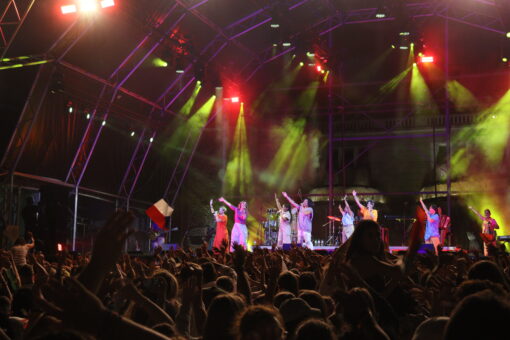
Aug 18, 2023 | Non categorizzato
From the end of July to the beginning of August 2023, Gen Verde travelled the length and breadth of Portugal. A fortnight long tour featuring art workshops and concerts. Many young people were involved in an experience of transforming music into a means of testimony and encounter. The journey, from 23rd July-4th August, started in Braga (north Portugal), continued south to the Algarve and concluded in Lisbon, in the festive and intoxicating atmosphere of a World Youth Day (WYD). This was the itinerary of the Gen Verde International Performing Arts Group, an all women band which began in 1966 from an inspiration of Chiara Lubich, founder of the Focolare Movement. 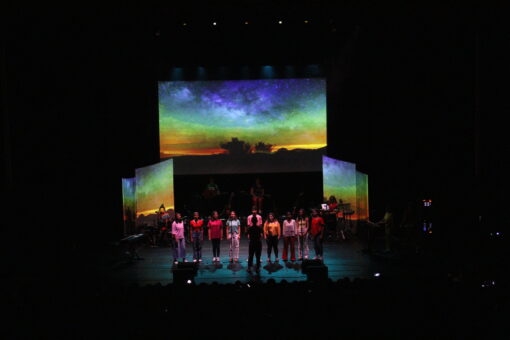 It was a demanding tour characterized by encounters and friendship. The seeds sown through words and notes yielded a rich harvest of real life experiences. One of Gen Verde’s projects is the “Start Now” workshop, a musical and artistic project which focuses on peace and dialogue education. One such workshop took place in Braga with an amazing group of young people from Spain and Portugal and included a special collaboration with Projeto Homem Braga (PHB). PHB specializes in the treatment, prevention, harm reduction and reintegration of people with addictions. After a meeting with Gen Verde, one of the PHB educators said, “We usually feel a bit anxious when we invite people from outside to get to know the users of our Centre because we don’t want to disturb their recovery process. Today we have to thank you for giving so much joy to all of us”. A Spanish boy who attended the workshop commented, “We have discovered that music, dance and art can really help us overcome many barriers, such as linguistic and cultural barriers. Sometimes it’s difficult to ‘row’ in the same direction, it takes patience because we don’t all go at the same pace, but one thing we carry with us is the joy that is transmitted, beyond the difficulties. Love makes us overcome all conflicts”. To the sound of “Girl On A Mission (Magnificat)”, the song composed by Gen Verde for the WYD, the Band moved to Faro (Algarve- Portugal) where they participated in the Dioceses’ pre-WYD preparation, concluding on 31st July, with a concert in the Algarve Stadium. Next stop was the Portuguese capital for another “Start Now” workshop with about 100 young people. At the end, on 2nd August, the young people performed with the Band in the jam-packed Auditório da Faculdade de Medicina Dentária. A Portuguese girl said, “It was very gratifying to take part in an activity like this because we can learn about and get to know others. We understood that it is important both to say our opinion and to know how to lose that idea in teamwork. The word that summarizes everything we have learned is humility, to give others the opportunity to express themselves”. Another girl spoke about learning to overcome challenges in the sense of “being able to listen, to understand others’ ideas, to learn how to interact, to let go of shyness and create something beautiful and do it together”. Marita Alvarez (Argentina), one of Gen Verde’s singers, told us: “Over the years, we have met many young people in our artistic workshops in many countries, from Slovakia, Poland, Ukraine, to Spain, Austria, Germany and Italy, to name a few. Deep, true and lasting relationships have been formed. We have seen how these young people become leaders of their communities, committed and ready to multiply joy through the “Magnificat anima mea” that God has brought about in their lives”.
It was a demanding tour characterized by encounters and friendship. The seeds sown through words and notes yielded a rich harvest of real life experiences. One of Gen Verde’s projects is the “Start Now” workshop, a musical and artistic project which focuses on peace and dialogue education. One such workshop took place in Braga with an amazing group of young people from Spain and Portugal and included a special collaboration with Projeto Homem Braga (PHB). PHB specializes in the treatment, prevention, harm reduction and reintegration of people with addictions. After a meeting with Gen Verde, one of the PHB educators said, “We usually feel a bit anxious when we invite people from outside to get to know the users of our Centre because we don’t want to disturb their recovery process. Today we have to thank you for giving so much joy to all of us”. A Spanish boy who attended the workshop commented, “We have discovered that music, dance and art can really help us overcome many barriers, such as linguistic and cultural barriers. Sometimes it’s difficult to ‘row’ in the same direction, it takes patience because we don’t all go at the same pace, but one thing we carry with us is the joy that is transmitted, beyond the difficulties. Love makes us overcome all conflicts”. To the sound of “Girl On A Mission (Magnificat)”, the song composed by Gen Verde for the WYD, the Band moved to Faro (Algarve- Portugal) where they participated in the Dioceses’ pre-WYD preparation, concluding on 31st July, with a concert in the Algarve Stadium. Next stop was the Portuguese capital for another “Start Now” workshop with about 100 young people. At the end, on 2nd August, the young people performed with the Band in the jam-packed Auditório da Faculdade de Medicina Dentária. A Portuguese girl said, “It was very gratifying to take part in an activity like this because we can learn about and get to know others. We understood that it is important both to say our opinion and to know how to lose that idea in teamwork. The word that summarizes everything we have learned is humility, to give others the opportunity to express themselves”. Another girl spoke about learning to overcome challenges in the sense of “being able to listen, to understand others’ ideas, to learn how to interact, to let go of shyness and create something beautiful and do it together”. Marita Alvarez (Argentina), one of Gen Verde’s singers, told us: “Over the years, we have met many young people in our artistic workshops in many countries, from Slovakia, Poland, Ukraine, to Spain, Austria, Germany and Italy, to name a few. Deep, true and lasting relationships have been formed. We have seen how these young people become leaders of their communities, committed and ready to multiply joy through the “Magnificat anima mea” that God has brought about in their lives”. 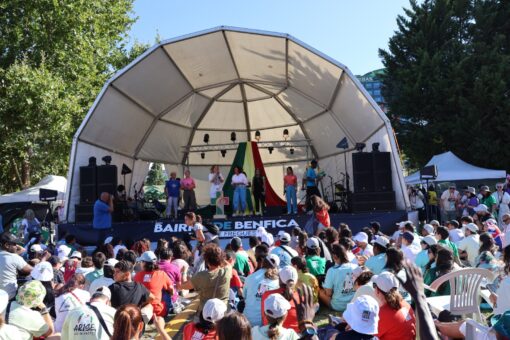 With the WYD, Lisbon gleamed with all the colours of youth. It was a unique opportunity to give witness and at the same time, experience the vivacity of a pilgrim Church which, from all parts of the globe, calls us by name. In this family spirit, Gen Verde took part in the second day of the “Rise Up” catechesis organized by the Focolare Movement. They sang and animated the Mass with over 7,000 young people. They then concluded their trip to Portugal on 4th August, with a concert in Alameda Dom Afonso Henriques, at the end of the Halleluya Festival.
With the WYD, Lisbon gleamed with all the colours of youth. It was a unique opportunity to give witness and at the same time, experience the vivacity of a pilgrim Church which, from all parts of the globe, calls us by name. In this family spirit, Gen Verde took part in the second day of the “Rise Up” catechesis organized by the Focolare Movement. They sang and animated the Mass with over 7,000 young people. They then concluded their trip to Portugal on 4th August, with a concert in Alameda Dom Afonso Henriques, at the end of the Halleluya Festival.  Jesús Morán, Co-President of the Focolare Movement was there and had this impression, “I was very struck by their unity. The young people were overjoyed. They were all taken by the rhythm and the music, but the songs include many deep moments and in those, the young people were able to pause and reflect. I thought it was like a ‘fifteenth station’ of the Via Crucis! There is no such thing and yet as everyone says and imagines, it is a sign of the Resurrection. It was a hymn to the Resurrection, to joy. I believe that this is the right way to communicate the Gospel with a musical language that young people love”.
Jesús Morán, Co-President of the Focolare Movement was there and had this impression, “I was very struck by their unity. The young people were overjoyed. They were all taken by the rhythm and the music, but the songs include many deep moments and in those, the young people were able to pause and reflect. I thought it was like a ‘fifteenth station’ of the Via Crucis! There is no such thing and yet as everyone says and imagines, it is a sign of the Resurrection. It was a hymn to the Resurrection, to joy. I believe that this is the right way to communicate the Gospel with a musical language that young people love”.
Maria Grazia Berretta
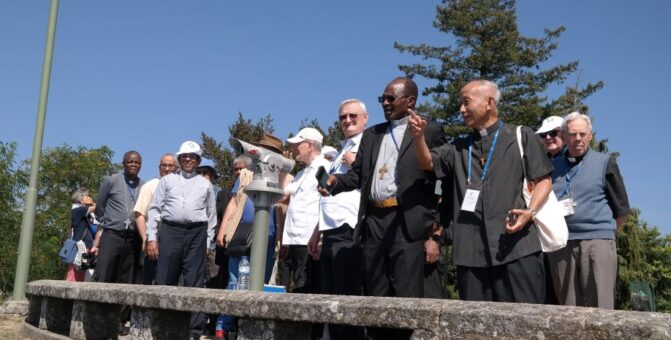
Aug 15, 2023 | Non categorizzato
After World Youth Day in Lisbon, the International Meeting of Bishops Friends of the Focolare Movement was held from 8th-10th August 2023 in Braga, northern Portugal. In the aftermath of the World Youth Day in Lisbon, 87 bishops from 42 countries stayed on in Portugal for a meeting, organised by the 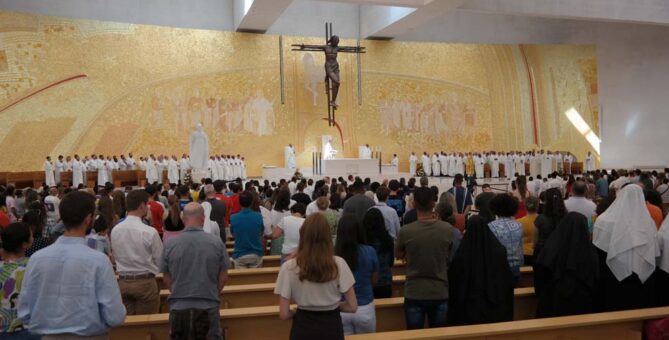 Bishops Friends of the Focolare Movement. They gathered to reflect on “The Mysticism of Encounter – Contemplation and Mission in a Changing Age“. En route to Braga, on 7th August, the first stop had to be the Shrine of Our Lady of Fatima, as it was the feast day of the two shepherd saints, Francisco and Jacinta. Recognising that massive changes are occurring, which call for an adequate response also from the Church, from 8th-10th August they reflected on and put into practice the “mysticism of we”, seen as a response to the new stage of witness and proclamation of the Gospel to which the Holy Spirit is calling the Church today. They took up once more Pope Francis words to the Focolare Movement on his visit to the little town of Loppiano in 2018, when he said that the charism of unity given to Chiara Lubich “is a providential stimulus and a powerful help to live the evangelical mysticism of ‘we’”. Margaret Karram, President of the Focolare Movement, and Jesús Morán, Co-President, attended the whole meeting and made various contributions. Margaret’s talk invited everyone to “Start from unity in order to ‘be’ and to ‘speak’ today“. Unity is the life of God, she said,
Bishops Friends of the Focolare Movement. They gathered to reflect on “The Mysticism of Encounter – Contemplation and Mission in a Changing Age“. En route to Braga, on 7th August, the first stop had to be the Shrine of Our Lady of Fatima, as it was the feast day of the two shepherd saints, Francisco and Jacinta. Recognising that massive changes are occurring, which call for an adequate response also from the Church, from 8th-10th August they reflected on and put into practice the “mysticism of we”, seen as a response to the new stage of witness and proclamation of the Gospel to which the Holy Spirit is calling the Church today. They took up once more Pope Francis words to the Focolare Movement on his visit to the little town of Loppiano in 2018, when he said that the charism of unity given to Chiara Lubich “is a providential stimulus and a powerful help to live the evangelical mysticism of ‘we’”. Margaret Karram, President of the Focolare Movement, and Jesús Morán, Co-President, attended the whole meeting and made various contributions. Margaret’s talk invited everyone to “Start from unity in order to ‘be’ and to ‘speak’ today“. Unity is the life of God, she said, 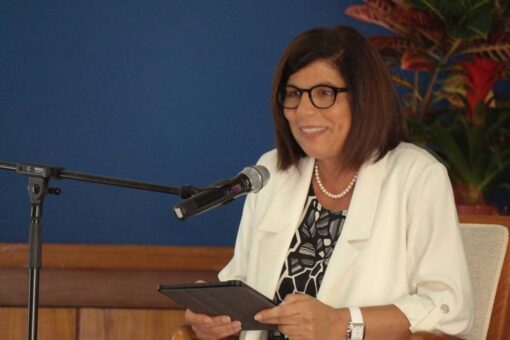 and we who want to imitate that life are invited to live it and we have a duty to proclaim it courageously. The comments and sharing in plenary that followed highlighted a renewed faith in the importance of seeking unity in the Church and in the world; and language groups enabled further deepening of the subject.
and we who want to imitate that life are invited to live it and we have a duty to proclaim it courageously. The comments and sharing in plenary that followed highlighted a renewed faith in the importance of seeking unity in the Church and in the world; and language groups enabled further deepening of the subject. 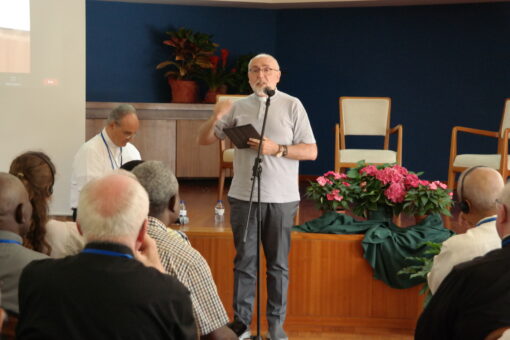 The various components of each day contributed to experiencing the ‘mysticism of we’, whether that was in the conversation with a group of young people who took part in WYD; in the testimonies shared by bishops on the synodal path; or insights into the daily life and suffering of particular Churches. Insights
The various components of each day contributed to experiencing the ‘mysticism of we’, whether that was in the conversation with a group of young people who took part in WYD; in the testimonies shared by bishops on the synodal path; or insights into the daily life and suffering of particular Churches. Insights 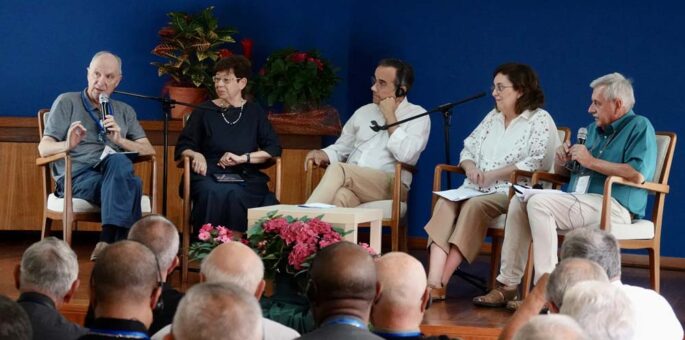 A few weeks before the Synod Assembly in October, Cardinal Mario Grech, Secretary of the Synod, and Prof. Piero Coda, a member of the Synod’s theological team, contributed to the meeting by video link. The Synod aims to help us rediscover unity in the one baptism, to equip us to live together despite our differences, and to teach us how to inhabit the tensions in which we inevitably find ourselves. A panel discussion that set out to present some answers to the pressing problems in the Church and societies today, generated much interest and led to numerous questions. Father Fabio Ciardi, OMI, emphasised the treasures to be found in charisms both old and new; Francesca Di Giovanni, former undersecretary of the Vatican State, spoke of the place of women in the Church, who must not only be valued according to roles they might have but considered in view of the
A few weeks before the Synod Assembly in October, Cardinal Mario Grech, Secretary of the Synod, and Prof. Piero Coda, a member of the Synod’s theological team, contributed to the meeting by video link. The Synod aims to help us rediscover unity in the one baptism, to equip us to live together despite our differences, and to teach us how to inhabit the tensions in which we inevitably find ourselves. A panel discussion that set out to present some answers to the pressing problems in the Church and societies today, generated much interest and led to numerous questions. Father Fabio Ciardi, OMI, emphasised the treasures to be found in charisms both old and new; Francesca Di Giovanni, former undersecretary of the Vatican State, spoke of the place of women in the Church, who must not only be valued according to roles they might have but considered in view of the  ‘gift’ they are for the Church. Rosinha and Amandio Cruz, a married couple working within the Archdiocese of Braga, presented aspects of the renewal of the Church and of evangelisation which are supported in particular by families. On the last day, Father Fabio Ciardi spoke on the ‘wounds’ of the Church today, and on the light Chiara Lubich had found in the discovery-revelation of Jesus Forsaken. He is the one who took upon himself every division and who generates reconciliation; he is the foundation of the ‘mysticism of we’. There were also moments of recreation and cultural enrichment, such as the visit to the nearby Bom Jesus do Monte Shrine, where Cardinal Francis Kriengsak, Archbishop of Bangkok, presided over the Eucharistic celebration. Francis Kriengsak, Then, with a glorious sunset as a backdrop, the local Focolare community offered a typical Portuguese dinner, followed by an exhibition of traditional dances. At the conclusion of the meeting, in the Mass presided over by Cardinal Lazarus You, Prefect of the Dicastery for the Clergy, the Bishops renewed their commitment to put into practice Jesus’ commandment: “love one another as I have loved you” (Jn 15:12).
‘gift’ they are for the Church. Rosinha and Amandio Cruz, a married couple working within the Archdiocese of Braga, presented aspects of the renewal of the Church and of evangelisation which are supported in particular by families. On the last day, Father Fabio Ciardi spoke on the ‘wounds’ of the Church today, and on the light Chiara Lubich had found in the discovery-revelation of Jesus Forsaken. He is the one who took upon himself every division and who generates reconciliation; he is the foundation of the ‘mysticism of we’. There were also moments of recreation and cultural enrichment, such as the visit to the nearby Bom Jesus do Monte Shrine, where Cardinal Francis Kriengsak, Archbishop of Bangkok, presided over the Eucharistic celebration. Francis Kriengsak, Then, with a glorious sunset as a backdrop, the local Focolare community offered a typical Portuguese dinner, followed by an exhibition of traditional dances. At the conclusion of the meeting, in the Mass presided over by Cardinal Lazarus You, Prefect of the Dicastery for the Clergy, the Bishops renewed their commitment to put into practice Jesus’ commandment: “love one another as I have loved you” (Jn 15:12).
Carlos Mana


 You have just edited a book entitled, “Synodality and Participation, the ecclesial subject of mission”, (published by Città Nuova). It is a collection of interventions of experts from the ecclesiastical and theological world. What is the contribution of this text in the light of the documents which have emerged from the various stages of the Synodal Path and on the verge of the new universal stage? The book is a collection of the inputs of a research seminar organized by the CEG, on 24th June, 2023 at the “Vinea mea” Spirituality Centre in Loppiano (Italy). The seminar was entitled: “Participate/preside/decide. Sacramental root and communal dynamic in the journey of the people of God on mission”. Over thirty scholars participated, including theologians and canon lawyers engaged in responding to the invitation expressed in the Instrumentum laboris, to rebalance the relationship between two fundamental ecclesiological principles: that of “authority”, strongly affirmed in the current Code of Canon Law, and that of “participation”, which the current Synod is relaunching as an ordinary practice of the life of the Church. We asked the experts present at the Seminar how we can effectively enable the active participation of each member of the people of God (faithful and pastors) within our communities? Will such participation remain at an advisory level or will it have authority? Will it be a matter of negotiating for a legal “concession” or rather of “recognizing” the decision-making capacity of the collective subject of ecclesial action as it emerges from the ecclesiology of the Second Vatican Council? And will an update of the Code of Canon Law be necessary? As Card. Mario Grech, Secretary General of the Synod, said, the synodal journey has entered a new phase: it is called to become a generating, dynamic event and not simply to be reduced to a solemn celebratory transient moment. How can the Church listen to the Holy Spirit without listening to the entire holy people of God? As Card. Francesco Coccopalmerio, Severino Dianich, Alphonse Borras and P. Coda, in their dense interventions contained in the book say, the answer to this question has an impact on pastoral practice (think of the various parish, diocesan councils, etc.) and on formation, as well as on theology and canon law. (https://edizionicittanuova.it/prodotto/sinodalita-e-partecipazione/).
You have just edited a book entitled, “Synodality and Participation, the ecclesial subject of mission”, (published by Città Nuova). It is a collection of interventions of experts from the ecclesiastical and theological world. What is the contribution of this text in the light of the documents which have emerged from the various stages of the Synodal Path and on the verge of the new universal stage? The book is a collection of the inputs of a research seminar organized by the CEG, on 24th June, 2023 at the “Vinea mea” Spirituality Centre in Loppiano (Italy). The seminar was entitled: “Participate/preside/decide. Sacramental root and communal dynamic in the journey of the people of God on mission”. Over thirty scholars participated, including theologians and canon lawyers engaged in responding to the invitation expressed in the Instrumentum laboris, to rebalance the relationship between two fundamental ecclesiological principles: that of “authority”, strongly affirmed in the current Code of Canon Law, and that of “participation”, which the current Synod is relaunching as an ordinary practice of the life of the Church. We asked the experts present at the Seminar how we can effectively enable the active participation of each member of the people of God (faithful and pastors) within our communities? Will such participation remain at an advisory level or will it have authority? Will it be a matter of negotiating for a legal “concession” or rather of “recognizing” the decision-making capacity of the collective subject of ecclesial action as it emerges from the ecclesiology of the Second Vatican Council? And will an update of the Code of Canon Law be necessary? As Card. Mario Grech, Secretary General of the Synod, said, the synodal journey has entered a new phase: it is called to become a generating, dynamic event and not simply to be reduced to a solemn celebratory transient moment. How can the Church listen to the Holy Spirit without listening to the entire holy people of God? As Card. Francesco Coccopalmerio, Severino Dianich, Alphonse Borras and P. Coda, in their dense interventions contained in the book say, the answer to this question has an impact on pastoral practice (think of the various parish, diocesan councils, etc.) and on formation, as well as on theology and canon law. (https://edizionicittanuova.it/prodotto/sinodalita-e-partecipazione/). 

 It was a demanding tour characterized by encounters and friendship. The seeds sown through words and notes yielded a rich harvest of real life experiences. One of Gen Verde’s projects is the
It was a demanding tour characterized by encounters and friendship. The seeds sown through words and notes yielded a rich harvest of real life experiences. One of Gen Verde’s projects is the  With the WYD, Lisbon gleamed with all the colours of youth. It was a unique opportunity to give witness and at the same time, experience the vivacity of a pilgrim Church which, from all parts of the globe, calls us by name. In this family spirit, Gen Verde took part in the second day of the “Rise Up” catechesis organized by the Focolare Movement. They sang and animated the Mass with over 7,000 young people. They then concluded their trip to Portugal on 4th August, with a concert in Alameda Dom Afonso Henriques, at the end of the Halleluya Festival.
With the WYD, Lisbon gleamed with all the colours of youth. It was a unique opportunity to give witness and at the same time, experience the vivacity of a pilgrim Church which, from all parts of the globe, calls us by name. In this family spirit, Gen Verde took part in the second day of the “Rise Up” catechesis organized by the Focolare Movement. They sang and animated the Mass with over 7,000 young people. They then concluded their trip to Portugal on 4th August, with a concert in Alameda Dom Afonso Henriques, at the end of the Halleluya Festival. 
 Bishops Friends of the Focolare Movement. They gathered to reflect on “The Mysticism of Encounter – Contemplation and Mission in a Changing Age“. En route to Braga, on 7th August, the first stop had to be the Shrine of Our Lady of Fatima, as it was the feast day of the two shepherd saints, Francisco and Jacinta. Recognising that massive changes are occurring, which call for an adequate response also from the Church, from 8th-10th August they reflected on and put into practice the “mysticism of we”, seen as a response to the new stage of witness and proclamation of the Gospel to which the Holy Spirit is calling the Church today. They took up once more Pope Francis words to the Focolare Movement on his visit to the little town of Loppiano in 2018, when he said that the charism of unity given to Chiara Lubich “is a providential stimulus and a powerful help to live the evangelical mysticism of ‘we’”. Margaret Karram, President of the Focolare Movement, and Jesús Morán, Co-President, attended the whole meeting and made various contributions. Margaret’s talk invited everyone to “Start from unity in order to ‘be’ and to ‘speak’ today“. Unity is the life of God, she said,
Bishops Friends of the Focolare Movement. They gathered to reflect on “The Mysticism of Encounter – Contemplation and Mission in a Changing Age“. En route to Braga, on 7th August, the first stop had to be the Shrine of Our Lady of Fatima, as it was the feast day of the two shepherd saints, Francisco and Jacinta. Recognising that massive changes are occurring, which call for an adequate response also from the Church, from 8th-10th August they reflected on and put into practice the “mysticism of we”, seen as a response to the new stage of witness and proclamation of the Gospel to which the Holy Spirit is calling the Church today. They took up once more Pope Francis words to the Focolare Movement on his visit to the little town of Loppiano in 2018, when he said that the charism of unity given to Chiara Lubich “is a providential stimulus and a powerful help to live the evangelical mysticism of ‘we’”. Margaret Karram, President of the Focolare Movement, and Jesús Morán, Co-President, attended the whole meeting and made various contributions. Margaret’s talk invited everyone to “Start from unity in order to ‘be’ and to ‘speak’ today“. Unity is the life of God, she said,  and we who want to imitate that life are invited to live it and we have a duty to proclaim it courageously. The comments and sharing in plenary that followed highlighted a renewed faith in the importance of seeking unity in the Church and in the world; and language groups enabled further deepening of the subject.
and we who want to imitate that life are invited to live it and we have a duty to proclaim it courageously. The comments and sharing in plenary that followed highlighted a renewed faith in the importance of seeking unity in the Church and in the world; and language groups enabled further deepening of the subject.  The various components of each day contributed to experiencing the ‘mysticism of we’, whether that was in the conversation with a group of young people who took part in WYD; in the testimonies shared by bishops on the synodal path; or insights into the daily life and suffering of particular Churches. Insights
The various components of each day contributed to experiencing the ‘mysticism of we’, whether that was in the conversation with a group of young people who took part in WYD; in the testimonies shared by bishops on the synodal path; or insights into the daily life and suffering of particular Churches. Insights  A few weeks before the Synod Assembly in October, Cardinal Mario Grech, Secretary of the Synod, and Prof. Piero Coda, a member of the Synod’s theological team, contributed to the meeting by video link. The Synod aims to help us rediscover unity in the one baptism, to equip us to live together despite our differences, and to teach us how to inhabit the tensions in which we inevitably find ourselves. A panel discussion that set out to present some answers to the pressing problems in the Church and societies today, generated much interest and led to numerous questions. Father Fabio Ciardi, OMI, emphasised the treasures to be found in charisms both old and new; Francesca Di Giovanni, former undersecretary of the Vatican State, spoke of the place of women in the Church, who must not only be valued according to roles they might have but considered in view of the
A few weeks before the Synod Assembly in October, Cardinal Mario Grech, Secretary of the Synod, and Prof. Piero Coda, a member of the Synod’s theological team, contributed to the meeting by video link. The Synod aims to help us rediscover unity in the one baptism, to equip us to live together despite our differences, and to teach us how to inhabit the tensions in which we inevitably find ourselves. A panel discussion that set out to present some answers to the pressing problems in the Church and societies today, generated much interest and led to numerous questions. Father Fabio Ciardi, OMI, emphasised the treasures to be found in charisms both old and new; Francesca Di Giovanni, former undersecretary of the Vatican State, spoke of the place of women in the Church, who must not only be valued according to roles they might have but considered in view of the 